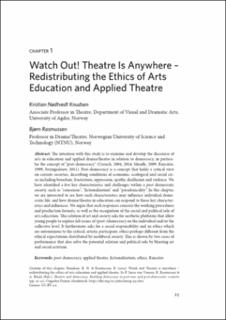Watch Out! Theatre Is Anywhere – Redistributing the Ethics of Arts Education and Applied Theatre
Chapter
Published version

Åpne
Permanent lenke
https://hdl.handle.net/11250/2826278Utgivelsesdato
2021Metadata
Vis full innførselSamlinger
Originalversjon
10.23865/noasp.135Sammendrag
The intention with this study is to examine and develop the discourse of arts in education and applied drama/theatre in relation to democracy, in particular the concept of “post-democracy” (Crouch, 2004, 2016; Mouffe, 2009; Rancière, 1999; Swyngedouw, 2011). Post-democracy is a concept that holds a critical view on current societies, describing conditions of economic, ecological and social crisis including boredom, frustration, oppression, apathy, disillusion and violence. We have identified a few key characteristics and challenges within a post-democratic society, such as “consensus”, “fictionalization” and “paradoxicality”. In this chapter, we are interested to see how such characteristics may influence individual democratic life, and how drama/theatre in education can respond to those key characteristics and influences. We argue that such responses concern the working procedures and production formats, as well as the recognition of the social and political role of arts education. This relation of art and society asks for aesthetic platforms that allow young people to explore felt issues of (post-)democracy on the individual and/or the collective level. It furthermore asks for a social responsibility and an ethics which are autonomous to the critical, artistic participant, ethics perhaps different from the ethical expectations distributed by neoliberal society. This is shown by two cases of performance that also solve the potential relation and political role by blurring art and social activism.
